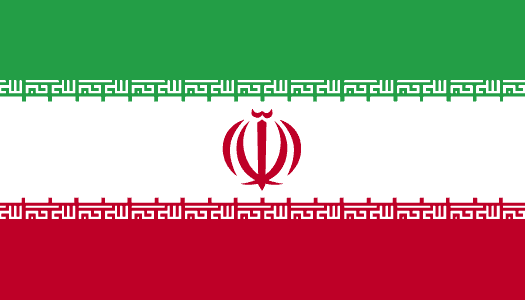Foreign Affairs
Iran Forced Militants To Stop Attacks On Bases After Major US Retaliation: REPORT

Iran flag (By by user:Marc Mongenet, - CIA World Factbook,, CC BY-SA 3.0, https://commons.wikimedia.org/w/index.php?curid=30206)
Iran pressured its proxy militias in Iraq and Syria to stop attacking American troops after the U.S. military conducted sweeping airstrikes in retaliation for the killing of three soldiers in late January, The New York Times reported, citing American and Iranian officials.
Since the Feb. 2 U.S. bombing wave and Feb. 7 assassination of a top terrorist leader, the Iran-backed militant groups that had fired rockets, missiles and drones at bases hosting U.S. troops dozens of times have essentially stopped their attacks, with only two minor ones in Syria, the NYT reported, citing American officials. Iran had let loose its proxies to protest U.S. support for Israel as it wages war against the Hamas terrorist group, but grew increasingly concerned the militias’ escalating attacks could drag Iran into outright war with the U.S., the officials reportedly said on condition of anonymity to discuss intelligence matters.
U.S. retaliation “may be having some effect,” Gen. Kenneth McKenzie, a former head of U.S. Central Command (CENTCOM), told the NYT. “The question is are the militias attacking or not, and at least for now, they are not,” he added.
As of Feb. 22, there had been no additional attacks on U.S. troops in Iraq and Syria since Feb. 4, Pentagon deputy press secretary Sabrina Singh said at a briefing. Before then, the militant groups had attacked bases in Iraq and Syria at least 170 times.
Worries that tit-for-tat responses to the attacks would provoke an escalation in regional conflict into all-out war faded, the NYT reported. The sole attack on a U.S. outpost in Jordan on Jan. 28 injured dozens of troops and killed three U.S. Army reservists from Georgia, CENTCOM said, prompting the first large-scale retaliation from the U.S. since attacks began in October.
The National Security Council and the DOD did not immediately respond to the Daily Caller News Foundation’s requests for comment.
Iran trains, finances and arms dozens of quasi-political and militant groups across the Middle East, according to the NYT. In Iraq and Syria, the main proxies responsible for attacks are Katai’b Hezbollah, which has banded with other groups under the banner of the Islamic Resistance of Iraq, and Harakat al-Nujaba.
Iran’s Islamic Revolutionary Guards Corps (IRGC) Quds Force and affiliated militia groups continue to represent a direct threat to the stability of Iraq, the region, and the safety of Americans. We will continue to take action, do whatever is necessary to protect our people, and… pic.twitter.com/Y53nvRfjjx
— U.S. Central Command (@CENTCOM) February 3, 2024
Brig. Gen. Esmail Ghaani heads the Quds Force, the elite branch of Iran’s paramilitary organization responsible for coordinating with Tehran’s proxy network. He has also played a role in shaping Iran’s response to Israel and the U.S. in relation to the war in Gaza, the NYT reported.
In January, Ghaani orchestrated multiple emergency meetings with strategists and senior militia and Islamic Revolutionary Guard Corps (IRGC) leaders in Tehran and Baghdad to devise a plan for staving off war with the U.S., the NYT reported, citing two Iranians affiliated with the IRGC.
Kataib Hezbollah and Harakat al-Nujaba at first resisted Ghaani’s urge to suspend attacks on U.S. troops because doing so was a necessary expression of their Islamist ideology, the Iranians said, according to the NYT. It took intervention from Tehran and from Iraqi Prime Minister Mohammen al-Sudani to persuade them to stop.
All content created by the Daily Caller News Foundation, an independent and nonpartisan newswire service, is available without charge to any legitimate news publisher that can provide a large audience. All republished articles must include our logo, our reporter’s byline and their DCNF affiliation. For any questions about our guidelines or partnering with us, please contact [email protected].

